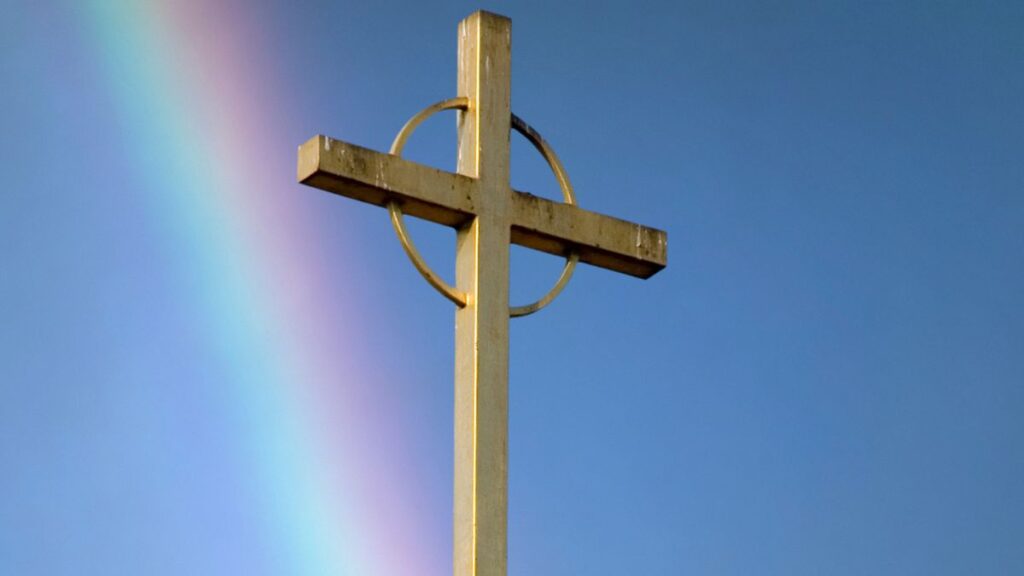
When my twin girls were 12, they decided that they wanted to be baptized in our church. It was a proud moment for me because when so many of their peers were running away from the church, they were publicly saying that they believed in Jesus. The church we attended was well equipped in media technology so whenever someone was baptized, they got to film a short video explaining why they were talking the step. We had friends and family, including teachers from their school come to witness the event. Unfortunately, topics raised during the sermon resulted and several of my friends never wanting to step inside a church again. I was left with a heavy lump in my throat. I honestly cannot remember the sermon topic. I just remember the pastor talking about the roles of men and women and sexuality. I remember cringing when he talked about knowing that people in the congregation struggled with same sex attraction, and that he would offer them prayer for healing, as if it was something that needed to be healed. I already knew that this was the view of the church, still, I sank back into my chair knowing that I would never measure up. A friend of mine who had come to church that Sunday to celebrate my girls, emailed the pastor about her concerns over what she had heard. The response she got back, as a church visitor was horrid, bigoted, and so very wrong. It only added fuel to the fire of her not wanting to have anything to do with the Christian community.
Years went on and I continued my desperate attempt to be ‘right’ or ‘holy’ in the eyes of the church. I can’t tell you how many times I would stand and sing along to a worship song about giving all my troubles and doubts to God when I knew deep down that my being gay wasn’t something that could be given away. Little did I realize at the time that it wasn’t something that needed to be given away. Depression flooded me for 44 years of my life because this is the teaching of the church.
This past year I was approached by a denomination that I am very familiar with about how they can best support the LGBTQIA+ community when the denomination itself hasn’t yet changed their policy on same sex marriage. It’s a difficult one, because what will ultimately make the difference is the change in policy, followed by massive reconciliation.
According to The Trevor Project, statistics show that 56% of LGBTQIA+ youth used alcohol in the past year, 47% of which were under the age of 21. 34% used marijuana and 111% used unprescribed prescription drugs. Regular drug and alcohol use among youth who identify as a part of the LGBTQIA+ community are at a 50% greater chance of attempting suicide. We all know that people who use alcohol or drugs use them as a means of coping with stressors. The impact the church has had over centuries on the acceptability of being a part of the LGBTQIA+ community has been the foundation of so many people’s pain, stress and perception of self-worth. Countless lives have been lost to addiction and suicide as a result. It is time for the church to step up and rectify the harm, as much as humanly possible. For more information check out – https://www.thetrevorproject.org/research-briefs/substance-use-and-suicide-risk-among-lgbtq-youth-jan-2022/
The church can play a significant role in supporting members of the PRIDE community within the church by creating an inclusive and welcoming environment where all members are valued and affirmed. Here are some ways in which the church can support members of the PRIDE community.
- Acceptance and affirmation: The church can openly and publicly affirm the dignity and worth of LGBTQIA+ individuals, making it clear that all members are valued, welcomed and affirmed. This is a hard one when a denomination has yet to change their policy. More about that on another blog and podcast!…
- Education and awareness: The church can provide education and awareness programs to help members understand the complexities of sexual orientation and gender identity, including the challenges faced by LGBTQIA+ individuals in society and within the church. I have heard far too many times the concept of, “Love the sinner, hate the sin.” Calling something that is organically a part of someone, “sin” is the opposite of love.
- Open communication: The church can encourage open communication and dialogue about LGBTQIA+ issues, creating a safe and supportive environment where members can share their stories and experiences.
- Pastoral care: The church can provide pastoral care to members of the LGBTQIA+ community, offering counseling, support, and guidance as they navigate their lives within the church and society while being accepted as being openly gay, trans etc…
- Advocacy and social justice: The church can advocate for LGBTQIA+ rights and social justice, speaking out against discrimination, and working to create more inclusive policies and practices within the church and society. It is incredibly important that reconciliation between the church and the LGBTQIA+ community starts. We often tell our children that saying “sorry” isn’t enough, but that they need to show that they are sorry. It is exactly the same thing.
- Celebrating diversity: The church can celebrate the diversity of its members, including the diversity of sexual orientation and gender identity, through special events and activities that promote inclusion and acceptance. How beautiful would it be to see once non-affirming churches march in the cities Pride Parade?
- Collaborating with LGBTQIA+ organizations: The church can collaborate with LGBTQIA+ organizations to support and advocate for the rights and well-being of LGBTQIA+ individuals, including partnering with organizations that provide resources and services to the LGBTQIA+ community.
What a breath of fresh air will it be when all this happens?
Dignity of all.
Worth of all.
All God’s children.

2 Responses
Know this, you will always be family, no matter how you live your life. Family is family. I have been in an institution, that demanded excellence, and I gave it. I was also in at the time the Military that women and gays were not allowed, it was the 80’s early 90’s. It was a brotherhood, although many gay women and men were in the forces, many kept it a secret for fear of retribution. They married to hide their lifestyle. Over time women were accepted in combat roles, around the same time gays were allowed to join the military. Never did I treat anyone differently, how could I, I lived my life the way I wanted to. Later in my career I worked alongside people who had different life styles, and when asked, being old school, how I felt about working with LGBTQ. I said to him, do you come to work on time, do you do your job to the best of your ability. He stated yes, and I responded with “thats all i can ask for”. He was happy with that and carried on working. Like the church it will take time for any kind of acceptance. There teachings are so ingrained, so deep, its a diamond to crack. Remember, you dont need a church to believe, you dont need acceptance from bigots who smile at you on sunday and talk behind your back for the rest of the week. You only need what is in your heart and a supportive family to be who you are. Luv you Cuz, be who you are.
I was pretty pleased to discover this web site. I want to to thank you for your time for this fantastic read!! I definitely really liked every bit of it and I have you book marked to see new things on your web site.